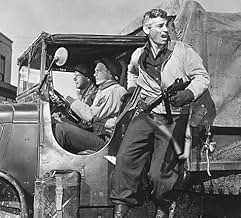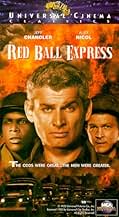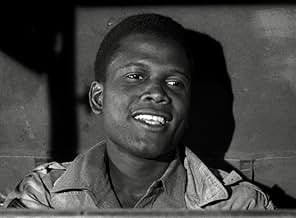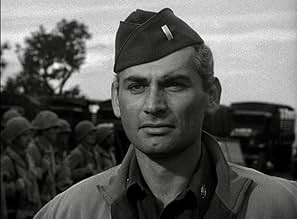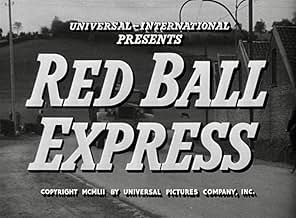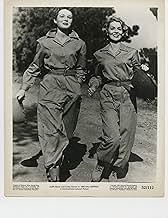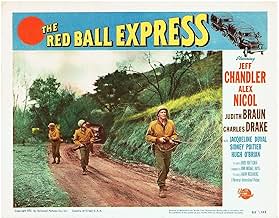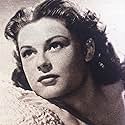IMDb RATING
6.3/10
1K
YOUR RATING
Story of the military truck drivers who kept the Allied armies supplied in Europe during World War II.Story of the military truck drivers who kept the Allied armies supplied in Europe during World War II.Story of the military truck drivers who kept the Allied armies supplied in Europe during World War II.
- Director
- Writers
- Stars
Davis Roberts
- Pvt. Dave McCord
- (as Robert Davis)
Gregg Palmer
- Tank Lieutenant
- (as Palmer Lee)
Douglas Bank
- Mechanic
- (uncredited)
George Barrows
- Soldier in Bistro
- (uncredited)
Nan Boardman
- French Peasant Mother
- (uncredited)
- Director
- Writers
- All cast & crew
- Production, box office & more at IMDbPro
Featured reviews
Midway through the war, the March of Time devoted time to a filmed panel discussion - quite a new idea, then - as to how the war was to be won. One comment was "This is a Quartermasters' war. Solve the issue of logistics and you've won the war".
That might have been the mission statement of this, very watchable, film
That might have been the mission statement of this, very watchable, film
It's a sad commentary that before the Armed Services were integrated post World War II by President Truman, the Red Ball Express was one of the few that black American soldiers could fully participate in and that one was relatively behind the lines.
Jeff Chandler plays the steely eyed commander of this bunch of formerly civilian truck drivers now chosen as a unit to supply Patton's advancing army with needed fuel. Among the cast is a young Sidney Poitier as one of the drivers. They may have been behind the lines, but the picture clearly shows their participation in the war wasn't an easy street.
Chandler's job is to weld this disparate bunch into a unit and he succeeds despite a lot of racial tension. The cast performs admirably in this picture.
One of the great stories of World War II was the rapid advance across France of Patton's army after the breakout from the Normandy beachhead. He could have never done it without the heroic efforts of the men depicted in this movie. It was Ike's and Patton's secret weapon and this picture an admirable tribute to them.
Jeff Chandler plays the steely eyed commander of this bunch of formerly civilian truck drivers now chosen as a unit to supply Patton's advancing army with needed fuel. Among the cast is a young Sidney Poitier as one of the drivers. They may have been behind the lines, but the picture clearly shows their participation in the war wasn't an easy street.
Chandler's job is to weld this disparate bunch into a unit and he succeeds despite a lot of racial tension. The cast performs admirably in this picture.
One of the great stories of World War II was the rapid advance across France of Patton's army after the breakout from the Normandy beachhead. He could have never done it without the heroic efforts of the men depicted in this movie. It was Ike's and Patton's secret weapon and this picture an admirable tribute to them.
10ebiros2
I'd have to say that this is a very interesting war time movie. It focuses on not the battle front, but the people who were responsible for the supply line behind the battle front.
The soldiers who are mostly rejects from the battle front are assigned to the Red Ball Express the troops comprising 6000 trucks to bring food, ammunition, and fuel.
This is an innocent looking movie, but it taught me the most important lesson of my life. That everything moves on a commerce. That war is a commerce. It's the delivery of the goods to the points of consumption that is everything. Almost nothing else matters, because if soldiers and tanks didn't have ammo and gas, there's no action. Everything in this world is the same way.
This kind of organized mobility decides the outcome of the war. America had good commander to realize this, and tactical minds to put it into action. Nobody was named a hero, but Patton couldn't have done what he did without the Red Ball Express.
This makes the movie one of the most memorable of all war time movies. I really loved it.
The soldiers who are mostly rejects from the battle front are assigned to the Red Ball Express the troops comprising 6000 trucks to bring food, ammunition, and fuel.
This is an innocent looking movie, but it taught me the most important lesson of my life. That everything moves on a commerce. That war is a commerce. It's the delivery of the goods to the points of consumption that is everything. Almost nothing else matters, because if soldiers and tanks didn't have ammo and gas, there's no action. Everything in this world is the same way.
This kind of organized mobility decides the outcome of the war. America had good commander to realize this, and tactical minds to put it into action. Nobody was named a hero, but Patton couldn't have done what he did without the Red Ball Express.
This makes the movie one of the most memorable of all war time movies. I really loved it.
RED BALL EXPRESS is alright I suppose . It's no masterpiece just a B war movie produced to be shown before a main feature . It involves a bunch of civilian truck drivers drafted into Uncle Sam's army in 1944 and it's those men who keep the allied front lines supplied . It's a rather predictable story of Americans fighting against Germans and where you think the most likable guy in the squad has bought the farm only for them to appear minutes later alive and well . Like I said very predictable
I guess somewhere the producers wanted to point out ( Though this would probably be known to an American audience in 1952 ) why every American war film made at the time always revolved around white American soldiers fighting . This was because the American army was segregated until 1947 and with very few exceptions black Americans didn't serve in the front lines . Despite the producers wanting to speak up fr the Black American war effort it looks painfully dated now since the blacks have lovely singing voices and sing in unison about beating Hitler which comes across as being very stereotypical and highly patronising and I doubt if a studio would be able to get away with this nowadays . Thankfully it serves to remind a wider audience in the 21st Century why war movie GIs are almost always white
I guess somewhere the producers wanted to point out ( Though this would probably be known to an American audience in 1952 ) why every American war film made at the time always revolved around white American soldiers fighting . This was because the American army was segregated until 1947 and with very few exceptions black Americans didn't serve in the front lines . Despite the producers wanting to speak up fr the Black American war effort it looks painfully dated now since the blacks have lovely singing voices and sing in unison about beating Hitler which comes across as being very stereotypical and highly patronising and I doubt if a studio would be able to get away with this nowadays . Thankfully it serves to remind a wider audience in the 21st Century why war movie GIs are almost always white
The setup, in case you don't already know it, is this. The troops of the western Allies were bottle necked in Normandy, France, for the first month or so after the D-Day landings. The armies finally broke through the German defenses and Gen. George Patton's Third Army rapidly advanced across central and northern France. So rapidly that they outpaced their supply lines. The U.S. Army put together a truck convoy system to keep Patton's forces supplied and named it the Red Ball Express. Aside from managing to keep up with Patton's advance, the outfit is also noted for being one of the few integrated units in the U.S. armed forces at the time--I use the term "integrated" somewhat guardedly, since that usually meant white senior officers leading black junior officers and enlisted men, which is not what would first come to my mind as "integrated." Regardless, around 75% of the servicemen in the Red Ball Express were African Americans.
You wouldn't know that from this movie, where the ratio seems to have been reversed. However, I'm willing to give the filmmakers some credit for at least trying to address the integration issue at the time when they were working rather than castigate them for not doing what we might expect a present-moment filmmaker to do. That's not the real problem with this movie as a movie. Acting is not the problem with this movie, either, as another reviewer suggested. The acting is workmanlike--neither outstanding nor poor, just efficient. No, the weakness of this movie is that it is simply another cliché-ridden war movie; blame not the messengers, but rather the script. First, there is the clichéd unit. Our two lead characters have a troubled past and, surprise surprise, are forced to work together in the same outfit ("of all the gin joints in all the towns . .."). The unit has a romantic, it has a "runt" of the litter with glasses, it has a stolid misunderstood commander, it has a guy clearly from Brooklyn, and so forth. Just like any other war movie of the day (think of, say, "Air Force" or "Guadalcanal Diary"). What's new here for the time is that the filmmakers exchanged African Americans for some of the other stereotypical roster of "average Americans" you got in any war movie. Notably, there are NO characters who are clearly supposed to be white Southerners--an omission that itself speaks volumes about how sensitive race relations were in the early 1950s in the U.S. and especially in the then-recently desegregated U.S. armed forces.
The clichéd unit is indicative of the rest of the flick. You've seen this movie before. Bunch of misfits forced to work together overcome their differences and become a cohesive fighting unit--well, except here I never really got the sense we were watching an outfit of misfits. Yes, there's the guy with the racial issue vs. Sidney Poitier, and yes, there's the lead characters with the troubled past--one of whom is the main stumbling block that's keeping this outfit from fully coming together (what's that you say? That setup sounds like "Flying Tigers"? no wait, "Sands of Iwo Jima"? no, wait . . .)--but the movie is in too much of hurry to get this outfit on the road to really *show* how this outfit becomes a team. Essentially it just is. What else, you ask? How about the sweet-talking American and the saucy French girl? Rivalry with another outfit, with other outfit finally recognizing our heroes are indeed Heroes? The guys who think there mission is going to be a cakewalk only to discover the Harsh Reality Of War? Etc., etc.
Oh, the movie is solid enough and hits all the standard points--some action, some down time, some roughhousing, a romantic moment or two, some grousing, some "let's pull together" time--and some of the cast members are likable enough that, all told, you won't feel like you wasted your time watching this one. However, aside from the then-timely touch of trying to show an integrated outfit there's nothing here to see you haven't seen before.
You wouldn't know that from this movie, where the ratio seems to have been reversed. However, I'm willing to give the filmmakers some credit for at least trying to address the integration issue at the time when they were working rather than castigate them for not doing what we might expect a present-moment filmmaker to do. That's not the real problem with this movie as a movie. Acting is not the problem with this movie, either, as another reviewer suggested. The acting is workmanlike--neither outstanding nor poor, just efficient. No, the weakness of this movie is that it is simply another cliché-ridden war movie; blame not the messengers, but rather the script. First, there is the clichéd unit. Our two lead characters have a troubled past and, surprise surprise, are forced to work together in the same outfit ("of all the gin joints in all the towns . .."). The unit has a romantic, it has a "runt" of the litter with glasses, it has a stolid misunderstood commander, it has a guy clearly from Brooklyn, and so forth. Just like any other war movie of the day (think of, say, "Air Force" or "Guadalcanal Diary"). What's new here for the time is that the filmmakers exchanged African Americans for some of the other stereotypical roster of "average Americans" you got in any war movie. Notably, there are NO characters who are clearly supposed to be white Southerners--an omission that itself speaks volumes about how sensitive race relations were in the early 1950s in the U.S. and especially in the then-recently desegregated U.S. armed forces.
The clichéd unit is indicative of the rest of the flick. You've seen this movie before. Bunch of misfits forced to work together overcome their differences and become a cohesive fighting unit--well, except here I never really got the sense we were watching an outfit of misfits. Yes, there's the guy with the racial issue vs. Sidney Poitier, and yes, there's the lead characters with the troubled past--one of whom is the main stumbling block that's keeping this outfit from fully coming together (what's that you say? That setup sounds like "Flying Tigers"? no wait, "Sands of Iwo Jima"? no, wait . . .)--but the movie is in too much of hurry to get this outfit on the road to really *show* how this outfit becomes a team. Essentially it just is. What else, you ask? How about the sweet-talking American and the saucy French girl? Rivalry with another outfit, with other outfit finally recognizing our heroes are indeed Heroes? The guys who think there mission is going to be a cakewalk only to discover the Harsh Reality Of War? Etc., etc.
Oh, the movie is solid enough and hits all the standard points--some action, some down time, some roughhousing, a romantic moment or two, some grousing, some "let's pull together" time--and some of the cast members are likable enough that, all told, you won't feel like you wasted your time watching this one. However, aside from the then-timely touch of trying to show an integrated outfit there's nothing here to see you haven't seen before.
Did you know
- TriviaLouis L'Amour's memoir, "Education of a Wandering Man", said this movie was actually based on his own war-time anecdotes. He was awarded two Bronze Star Medals while serving as an officer with the Red Ball Express.
- GoofsThe real Red Ball Express operated two separate roads for traffic (one going to the front and one for returning empty) Two-way traffic on a single road, as shown in the film , never occurred.
- Crazy creditsNo credits besides the title, seven minutes in the film.
- ConnectionsFeatured in Budd Boetticher: A Man Can Do That (2005)
- How long is Red Ball Express?Powered by Alexa
Details
- Runtime
- 1h 23m(83 min)
- Color
- Aspect ratio
- 1.37 : 1
Contribute to this page
Suggest an edit or add missing content

